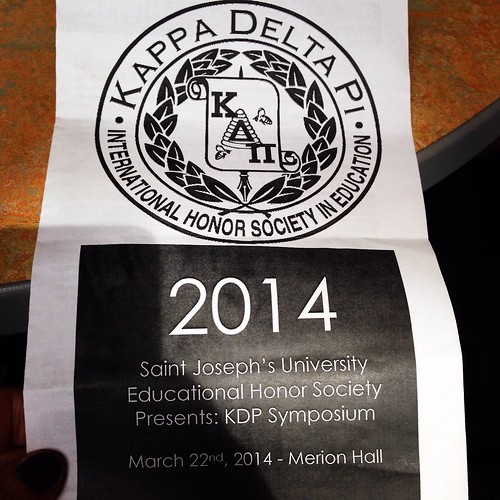Slice - Sharing My Passion
Yesterday was a great day.
You see, I'm almost 42 and I have a decent amount of teaching and life experience under my belt at this point. Until recently, though, I never really felt that I had anything to teach -- at least not to adults.
Several colleagues keep gently nudging me. "You should present," they say. "You have things you can share with others," they insist. I always feel like the things I do in my classroom are things *I* learned from others. Things that other people should rightly be the ones to share in front of "big people".
This past summer, I answered the call of the district tech department and ran a session on being a connected educator. We discussed and experimented with Twitter, Skype, Kidblog, etc.
 Yesterday, I joined a colleague in presenting at a symposium for preservice teachers. I met Janine several years ago (we actually had trouble yesterday figuring out exactly which year we met) through our master's program at the University of Connecticut. Our program was in Educational Psychology, with a focus in gifted education. We hang out most years at a summer conference called Confratute (about enrichment learning). Janine went on to earn her Ph.D. through UConn as well.
Yesterday, I joined a colleague in presenting at a symposium for preservice teachers. I met Janine several years ago (we actually had trouble yesterday figuring out exactly which year we met) through our master's program at the University of Connecticut. Our program was in Educational Psychology, with a focus in gifted education. We hang out most years at a summer conference called Confratute (about enrichment learning). Janine went on to earn her Ph.D. through UConn as well.Janine is currently a professor at St. Joseph's University. She primarily teaches math methods courses and technology, but tries to make sure that her students get some understanding of the special needs and challenges of the gifted students that will be in their classrooms. So when she asked me to come and be a "voice from the field" at their symposium, I was happy to agree. I guess I *do* have valuable experiences to share!
While our groups were on the small side (it was on a Saturday, and these college kids were self-selecting to attend), I was thrilled to see that they were eager to learn. Most teacher education programs give very limited time and attention to the needs of gifted children, and these young people dedicated some of their free time to hearing what we had to say.
Our session was structured around dispelling a handful of the typical misconceptions about gifted learners: (I'm going to focus on the idea of "mentally gifted" here, since that is the definition my state uses in identifying children for specially designed instruction. Remember, though, children can be gifted in many other areas besides academics.)
1) In general, children identified as gifted demonstrate advanced academic achievement across all subject areas.
-- I cringe when I hear adults say, "Aren't they gifted? Shouldn't they be able to...." The truth is that SOME gifted kids are advanced in many academic areas. SOME gifted kids are high in all academic areas. MOST gifted kids have certain areas of strength accompanied by other areas that are at grade level (or below). Remember, EVERY child is different... and that goes for gifted kids as well. Just because that child can easily solve an advanced math problem doesn't mean that they will be able to write a beautiful essay - or even write out an amazing explanation of how they solved that math problem!
2) Results from standardized, grade-level testing are sufficient for identifying gifted students.
-- Grade level testing is designed to show mastery of the material that is taught that year. End of year standardized testing tells us who knows the material at the end of the year - after instruction. Out of level assessment is needed to show who knows the material before instruction - who needs something else during their day to make sure they learn EVERY day.
-- There are many tools to use to help identify gifted learners. Some children will not show their gifted traits just through this grade level testing - for a variety of reasons (test bias, other disability areas, etc.). We must seek alternate ways to locate those children who need us to help develop their talents.
3) Tutoring other children in the class who need extra help with the material is an effective way to meet the needs of gifted students.
-- ACK! Please, please don't do this.
There may be SOME gifted kids who would love to help a peer (sometimes). SOME gifted kids grow up to become teachers, and have a knack for explanation. Other advanced learners really don't do a good job explaining to others, especially those who are struggling. What that advanced learner perceives as a "one jump" or two step problem may be something that other child needs broken down into 10 steps. This doesn't help the advanced learner OR the struggling child. Both end up frustrated, and this can even lead to social and emotional problems in the classroom.
Remember... this should be the goal of education... EVERY child learns something new EVERY day. If your gifted student already knew that material, and then finished the work to prove they knew the material, it doesn't help them learn something new to now have to teach others.
(I know many of you are educators. If you would like to learn more, and see some other common myths dispelled, check out this site: http://www.nagc.org/commonmyths.aspx)
I’m participating in a writing community at Two Writing Teachers. We write about a little "slice of our life" each Tuesday. In March - we attempt to write a slice EVERY day! Head over to their blog for the link up.
.JPG)


Comments
Post a Comment